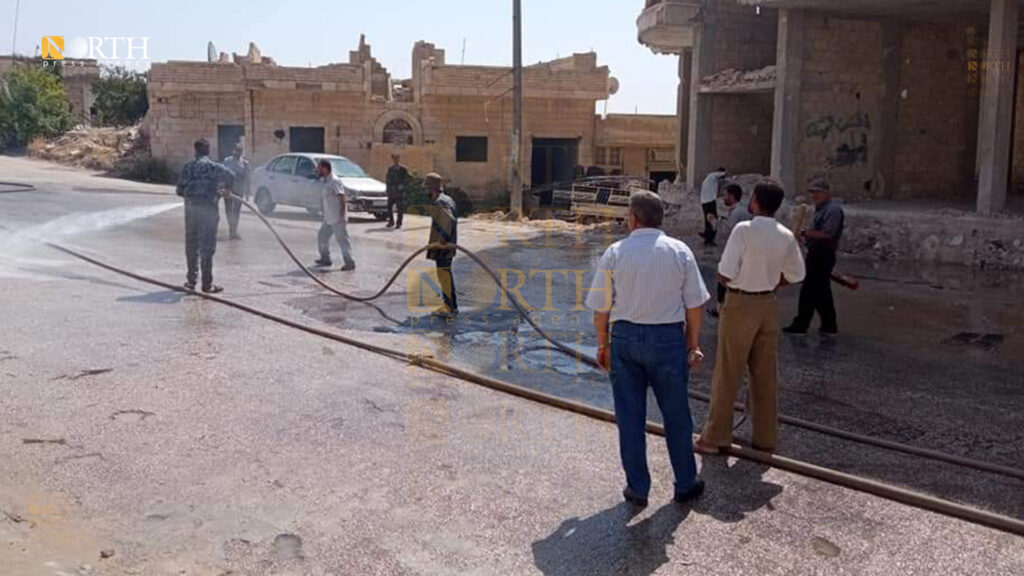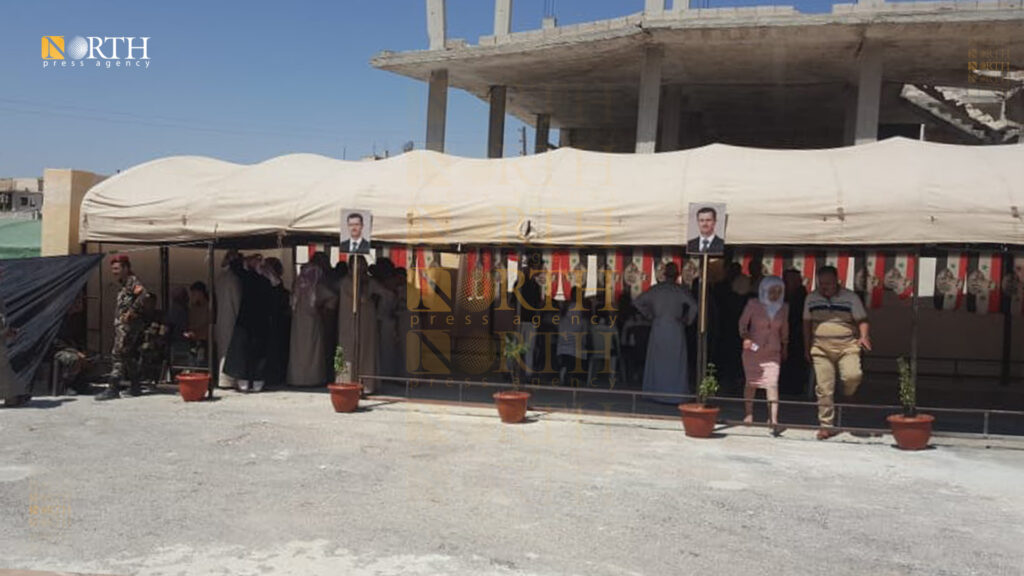IDLIB, Syria (North Press) – 40-year-old Somar sits in front of his tent within Karama camp gathering near the border town of Atmeh, north of Idlib, following, on his phone, up on statements by Syrian government officials about opening a settlement center and returning to the government-held areas in the southern and eastern countryside of Idlib.
Somar said, “How can I reconcile with killer of my children who destroyed my house, and was the reason for my displacement to camps, where I prefer to live to reconcile with al-Assad regime.”
Days ago, the Syrian government announced, in a statement, the opening of a settlement center in the town of Khan Shaykhoun, south of Idlib, for “all people of the governorate who reside in terrorist-held areas in the north.”
The settlement also covers those outside and inside Syria, including military personnel and civilians.
47-year-old Samer Ismail, a resident of the village of Deir Sharqi in the countryside of Ma`arat al-Nu`man, south of Idlib, which is in the government-held area, refuses this settlement, adding “It is a return to the lap of the Syrian regime.”

Though the government’s statement stressed that these are routine and simple procedures to settle status of those reach the center.
Ismail who lost three members of his family in an airstrike that targeted his house said “I do not trust the regime.”
“Who will guarantee that I will not be arrested and my family will not be assaulted if we return to the regime-held areas,” the IDP questioned about guarantors.
Fearing arrest
The settlement process begins on Monday in the temporary center of Idlib, Khan Sheykhoun.
The government announcement to open centers followed statements by the Turkish Foreign Minister, Mevlut Cavusoglu, on the need to find a way to reconcile the Syrian government and the opposition.
On August 11, Cavusoglu said, “We have to somehow bring opposition and the regime in Syria together to reach an agreement. Otherwise, there will be no lasting peace.”
The statements evoked outrage among people in opposition-held areas in northwestern Syria, where mass protests were staged against the reconciliation.
38-year-old Hisham Dabbas, in the town of Sarmada, north of Idlib, confirms that he will not accept the settlement, even if he is forced to leave Syria and stay outside.
Dabbas, who hails from Khan Shaykhun, said that Turkey is behind the settlement, “it seems that Turkey will force the opposition to reconcile with the government.”
He does not rule out that the opposition sits with the “Syrian regime” at one table especially abroad, “and this maybe raises fears of the residents, pushing them to settle their status.”
In order not to be arrested, the government will form a committee of locals and dignitaries, whose task is to “facilitate the arrival of wanted to the center.”
But Dabbas expects the government security apparatuses to arrest them as soon as they reach the government-held areas, stressing, “there are no guarantees.”
Deteriorating economic conditions are another reason that prevents Dabbas from returning to his hometown, “there are no job opportunities, and if they are available, wages are very low that they do not provide for a living.”
Risks of return
The government statement indicates that families, who are in opposition-held areas, will have their status settled, and they are allowed in their areas with their furniture, sheep and cars for free; in case the whole family returns.
Military deserters and civilian evaders will have their status settled, and they will be given one month to join service again.
32-year-old Mo’ayed Abdurrahman, a pseudonym for an activist from Maarat al-Numan, does not agree with Dabbas that the settlement centers related to the Turkish Foreign Minister’s statements.
Abdurrahman said that the Turkish minister’s reconciliation is “a larger and more comprehensive reconciliation that does not include individuals personally, but rather includes regions and villages.”

Abdurrahman pointed out that these centers “are not new, and they have existed since the beginning of the revolution. The regime also created the Ministry of National Reconciliation.”
He added, “Those who will return to the villages announced by the regime are those who already live in its areas of control or in fact they work within the ranks of its forces.”
The “regime” is establishing the settlement centers in cities and towns after finishing with stealing houses, houses of worship and streets, according to Abdurrahman.
He wonders, “If we assume, for the sake of argument, that he [who will settle his condition] will not be arrested, what forces him to return to a village that lacks the simplest aspects of life such as electricity, water, and communications, and let alone the danger of mines, unexploded bombs and ramshackle houses?”

